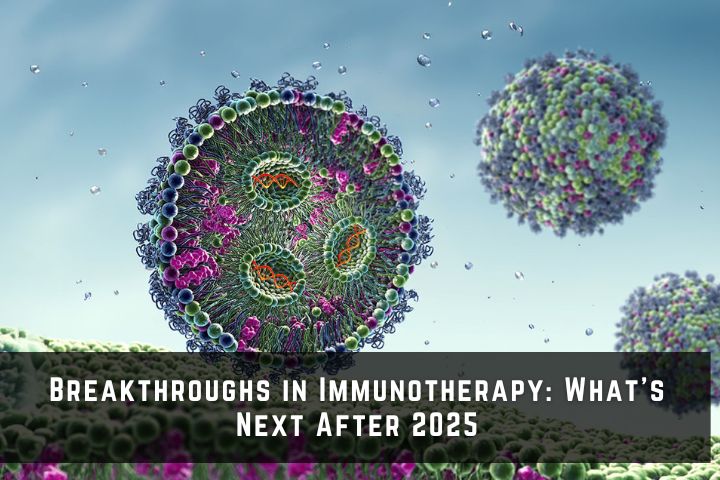Immunotherapy has redefined the way the world approaches cancer treatment. Over the past decade, it has evolved from a last-resort option to a front-line therapy, offering renewed hope to millions of patients globally. By harnessing the body’s own immune system to detect and destroy cancer cells, immunotherapy has transformed outcomes for diseases once deemed incurable.
As we move beyond 2025, the field of immuno-oncology is entering an exciting new chapter — one marked by cutting-edge science, advanced biotechnology, and increasingly personalized treatment approaches. The next wave of innovations promises to make cancer care more precise, powerful, and accessible than ever before.
1. The Evolution of Immunotherapy: A Decade of Discovery
Immunotherapy began as a novel concept but has now become a cornerstone of modern cancer care. Treatments such as checkpoint inhibitors (like pembrolizumab and nivolumab), CAR-T cell therapy, and cancer vaccines have already revolutionized how we fight cancer. These therapies work by either activating the immune system or removing the barriers that prevent immune cells from attacking tumors.
As we step into the post-2025 era, researchers are expanding beyond traditional immune targets. The focus is shifting to new immune checkpoints, dual-target antibodies, and next-generation cellular therapies. For example, bispecific T-cell engagers (BiTEs) are engineered antibodies that bind both immune cells and tumor cells simultaneously, boosting their ability to destroy cancer more efficiently.
Moreover, scientists are exploring ways to make immunotherapy effective across more cancer types, including those previously resistant to immune-based treatments such as pancreatic and brain cancers. The goal is clear — to turn immunotherapy into a universal, long-lasting, and accessible solution for all patients.
2. Personalized Immunotherapy: Tailoring Treatment to Each Patient
One of the biggest shifts after 2025 is the rise of personalized immunotherapy, where treatment plans are based on each patient’s genetic makeup, immune profile, and tumor environment. Advances in AI-driven genomics and biomarker discovery now enable oncologists to predict which patients are most likely to respond to specific immunotherapies.
Neoantigen vaccines — customized vaccines created from a patient’s tumor mutations — are emerging as a groundbreaking approach. These vaccines train the immune system to recognize cancer-specific proteins and mount a targeted attack. Similarly, engineered T-cell receptors (TCRs) and natural killer (NK) cell therapies are expanding the boundaries of precision immunotherapy by targeting a wider range of tumors.
Another exciting trend is the combination of immunotherapy with other treatment modalities like radiation, targeted therapy, and chemotherapy. These synergistic approaches are designed to enhance immune responses, overcome resistance, and create longer-lasting remissions.
The future of cancer treatment lies in personalization — not only in targeting tumors but also in optimizing safety, minimizing side effects, and improving patient outcomes.
3. The Future Ahead: AI, Microbiome, and Next-Gen Delivery
The next phase of immunotherapy will be defined by advanced technology and biology working hand in hand. Artificial intelligence (AI) and machine learning are being used to analyze massive datasets from patient records, imaging, and genetic profiles, helping doctors make faster and more accurate treatment decisions.
The human microbiome — the community of microorganisms in the gut — is also emerging as a key factor in immunotherapy success. Research shows that gut bacteria influence how well patients respond to immune-based treatments. Future therapies may include microbiome modulation, where probiotics or dietary interventions improve immune response and treatment efficiency.
In addition, scientists are working on nanotechnology-based drug delivery systems to transport immunotherapy agents directly to tumor sites, minimizing side effects and maximizing potency. The integration of robotics and AI-guided precision medicine will further streamline treatment delivery and monitoring, bringing immunotherapy closer to perfection.
Advanced Immunotherapy Care at Dr. A.V. Cancer Institute
At Dr. A.V. Cancer Institute, we are at the forefront of adopting these global innovations in immunotherapy and cancer treatment. Our expert team combines cutting-edge technology with compassionate, evidence-based care to provide patients with personalized immunotherapy options tailored to their specific cancer type and stage.
From checkpoint inhibitors to advanced cellular therapies, we ensure that every patient receives the most effective, safe, and advanced treatment available.
With a commitment to innovation, excellence, and patient-centered care, Dr. A.V. Cancer Institute provides the best services in immunotherapy and cancer management, helping patients lead healthier, longer, and more fulfilling lives.
Because at Dr. A.V. Cancer Institute, the future of cancer care is already here — and it begins with hope.

